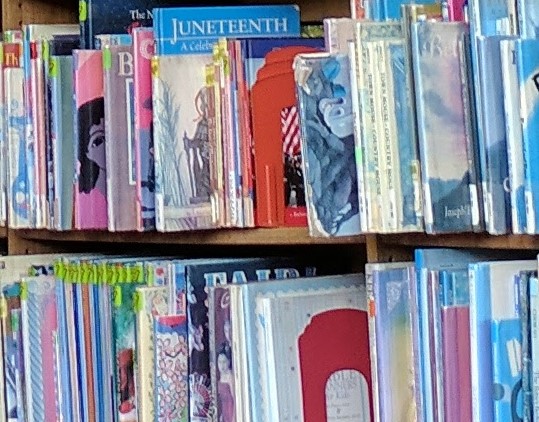The Municipal Election That Changed New Britain Politics For A Generation
Introduction:
In 1989, Donald DeFronzo became New Britain’s 34th Mayor ending the late William (Billy Mac) McNamara’s six terms as the city’s top elected official, a modern-day record not matched until last November when Mayor Erin Stewart won a sixth, two-year term.
“During the depths of the Covid pandemic in the spring and early summer of 2021 I began to write this (campaign) retrospective after watching a CNN documentary on the Vietnam War,” states DeFronzo. “One segment of that series dealt with the opposition to the war and the number of individuals who had achieved conscientious objector (CO) status and how that status impacted their lives. It caused me to question how many of these roughly 500,000 individuals had gone into a career in elective politics and government. Although my search was limited, I could not find one prominent politician who had been a conscientious objector. “
Growing up in New Britain, DeFronzo attended Saint Mary’s School and Saint Thomas Aquinas High School where he was editor of the Veritas, the school newspaper. ”Through High School the Vietnam conflict, occurring in a distant place, was a remote political drama. I’d say ignorant indifference was the disposition of most high school students in 1965-66. My brother, already in college, for me sounded the first credible concerns about the growing involvement there over the dinner table when he was home on break.”
DeFronzo, active in the Democratic Party from his college days at Fairfield University to the present, won the mayoralty backed by a broad-based coalition of Democrats and a personal door to door campaign that began in the winter of 1989 and continued into the primary and general election.
New Britain History
DeFronzo took on the incumbent with a “time for a change” message on taxes, spending and neighborhood needs. Withering attacks on his conscientious objector status from some but not all in the McNamara camp were intended to derail his candidacy. They failed.
Raw wounds and divisions over Vietnam at times dominated the 1989 municipal campaign 14 years after U.S. involvement ended. Voters, however, overwhelmingly decided DeFronzo’s act of conscience was irrelevant to running city government. It was “time for a change” at City Hall.
For DeFronzo 1989 was not only a political triumph in a first run for elective office, but a vindication of his deeply held beliefs. He would fulfil his obligation during the Vietnam years through alternative service.
In his retrospective DeFronzo shares the worries of his family, the risks and his determination to become a CO at the height of the Vietnam war. That experience began a career of public service lasting more than 50 years, including leading an American Federation of Teacher labor union. From two terms as Mayor, DeFronzo went on to serve as a state senator, state commissioner and holder of the Governor William O’Neill Chair in Public Policy and Practical Politics at Central Connecticut State University between 2016 and 2022. DeFronzo still resides in the same modest house with his wife Diane on Bedford Street where his successful mayoral run was launched 35 years ago.
DeFronzo observes that his first municipal campaign could be considered a “watershed” for his native city involving “a generational change, an ideological change or cultural change or perhaps some or all of these.” All told DeFronzo poured out more than 40,000 words telling his mayoral campaign story, He does not spare harsh judgments against the “sunshine patriots” who attacked him but recalls with gratitude family, coalition members and the voters who put him in the Mayor’s office.
Watershed: 1989’s Mayoral Election, excerpted here, is DeFronzo’s personal account of the 1989 municipal campaign based on his observations, the recollection of friends and news coverage at the time. A copy of Watershed is on file in the history room of the New Britain Public Library. Thanks to Don DeFronzo for permission to publish an abridged version in this series. John McNamara nbpoliticus.com
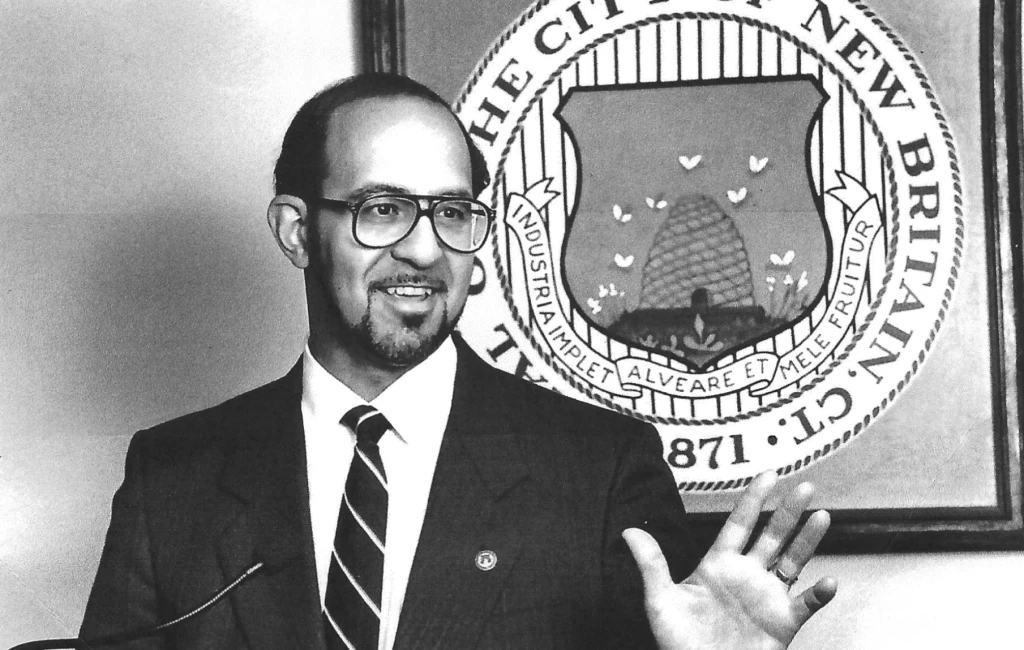
Part I
By Donald DeFronzo
In 1987 Mayor Bill McNamara was in search of his sixth term in office. The progressive wing of the party was in search of a candidate to oppose him. I considered a run for mayor that year, but an unresolved issue concerning my legal status to run for public office under the federal Hatch Act, caused me to decide against it. Although cleared to run later that year, it was already too late to organize a campaign.
McNamara defeated School Board member Marilyn Kraczkowsky in a Democratic Primary by a narrow margin and triumphed in a three-way general election in which Kraczkowsky ran as an Independent. He was now the second longest serving mayor in New Britain history and the longest serving mayor in the state.
Up until then, having never sought public office, I never had to confront the conscientious objector (CO) issue head on. As we moved into 1988 the prospects of a DeFronzo mayoral candidacy became more real. Senator Harper, leader of New Britain’s progressive wing, formed a political coalition with State Representative Stanley Krawiec, leader of the more conservative Polish American faction. Other members of the coalition were Lucian Pawlak, current City Treasurer, Steve Wasik, Alderman Edward “Butch” Dzwonkowski, President of the Pulaski Democratic Club Edward Kireczyk, Progressive leader and State Representative David Pudlin and Walter Clebowicz, a former alderman and harsh McNamara critic. Pawlak, Wasik and Dzwonkowski were affiliated with the Pulaski Club and Wasik had run for mayor unsuccessfully as an Independent. Dzwonkowski was a popular alderman who had lost a primary challenge for the State Senate seat to Joe Harper several years earlier. Clebowicz had been a very popular alderman who mounted an impressive independent race against McNamara in 1979 in which he amassed over 4,000 votes. The coalition would grow to include representatives of the growing Puerto Rican community, neighborhood activists and a number of former McNamara allies looking for a new home, including Jim Leavenworth, a skilled media professional.
Now branded as the “Coalition” by local newspapers, the group set up a process through which political candidates for local office could be assessed, and around whom, a consensus could be formed. I was encouraged to put my name into contention, and I did. Now the time had come to confront the serious CO issue.
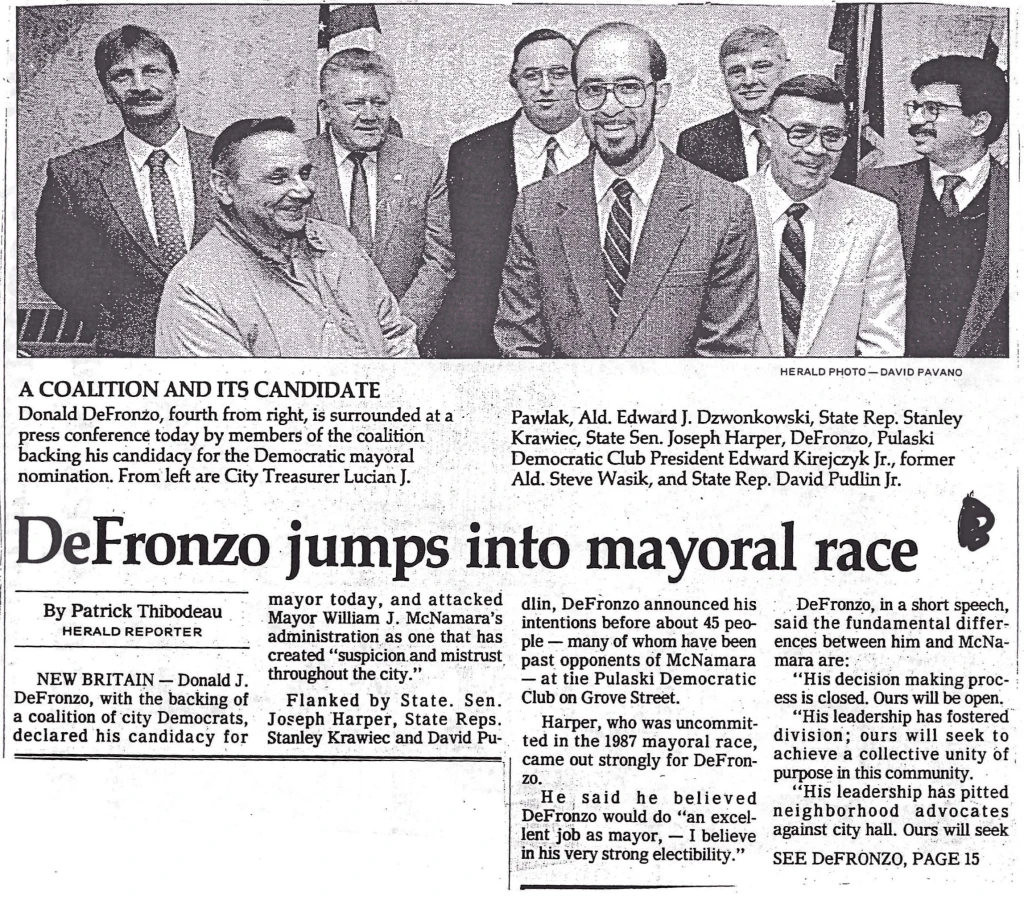
Diane and I had no doubt that, if I ran for mayor, the Conscientious Objector (CO) matter meant controversy. I had never made a secret of my opposition to the War in Vietnam and a good number of people in New Britain knew of my draft status. We believed from day one, it would have to addressed head on, and any effort to conceal it would be dishonest and politically foolish. When I was interviewed by the Coalition selection committee and asked if I had any issue, past or present, that might hinder my candidacy, I did not hesitate to the raise the CO issue. Senator Harper and Walter Clebowicz both knew about it and still were strong supporters. They believed that, if handled appropriately, it could be fought to a draw. The more conservative members of the Coalition were less certain about the impact of the CO issue, but gradually came to believe I would be the best person to oppose McNamara largely because of my work ethic, independence, government experience, and ability to work with diverse segments of the community.
In truth, some of the conservative members were more concerned about the beard I wore. I was flattered by the Coalition’s support. They had interviewed a large cross section of Democratic office holders, ethnic leaders and community activists, yet in the end I was their choice. In early February the Coalition made its decision and formally designated me as their candidate for mayor. Soon after that I formally announced my candidacy, accompanied by Coalition members at the Pulaski Democratic Club near ethnically rich Broad Street now designated “Little Poland”.
My comments that day were relatively brief but to the point:
“We believe this Coalition and its candidates represent the best chance for this city to establish new partnerships for municipal advancement. So, what are the real issues in this campaign? Let me draw some distinctions. His leadership is stagnant and closed to New Britain citizens. Ours will be fresh and open to all. His administration has survived on division. Ours will unify the community. His leadership has pitted neighborhood groups against City Hall. Ours will make City Hall the place where neighborhood issues are resolved.”
I focused on the issues of crime, taxes and education. I pledged to do the work that needed to be done and I concluded with this call to action:
“In closing, this campaign represents a window of opportunity for all those who have been shut out and excluded by the incumbent mayor.”
The race had begun. The Democratic endorsement session was scheduled in July. The party primary would be held in September and, if successful there, the general election would be in November.
True to my belief that the CO designation had to be addressed early, I included it in my official biography made available to the press also indicating that I had completed alternative service to military duty in compliance with federal law. As we now braced for the expected onslaught, we did several things.
We prepared draft responses to anticipated questions. We decided to speak to the morality of the war, the religious implications of an unjust war and to the unique nature of the Vietnam War. We also decided to acknowledge that some may disagree with my decisions from 25 years earlier. And if based on that, they could not support me, we would respect that decision and live with it. We were not out to change anyone’s mind. We were going to be respectful, but we would strongly defend my actions on the same moral grounds that earned me the CO designation in 1970. Diane, and some of her friends, thought that by speaking to the CO issue in moral and ethical terms, I could give voters an insight into a different type of politician.
Grassroots Polling
My brother, Jim, was an accomplished sociologist highly skilled in research methodology. This being my first shot at public office and knowing my name recognition was relatively poor, we thought a poll of Democratic voters would be invaluable. We were also eager to get some read on the seriousness of the CO issue and the public’s disposition to the issue.
Doing a poll was no small task. We had no money to hire a pollster, but we did have Jim, a large pool of volunteers and a group of professional political scientists who were willing to draft poll questions and tabulate the responses. Still, this would be a big job. To have a statistically valid poll, we would need between 350 to 400 responses. After some discussion, we decided to move forward.
We prepared draft responses to anticipated questions. We decided to speak to the morality of the war, the religious implications of an unjust war and to the unique nature of the Vietnam War. We also decided to acknowledge that some may disagree with my decisions from 25 years earlier. And if based on that, they could not support me, we would respect that decision and live with it. We were not out to change anyone’s mind. We were going to be respectful, but we would strongly defend my actions on the same moral grounds that earned me the CO designation in 1970. Diane, and some of her friends, thought that by speaking to the CO issue in moral and ethical terms, I could give voters an insight into a different type of politician.
However, what started out as a basic favorability poll, quickly evolved into a lengthy 33 question poll covering name recognition, candidate favorability, relevant issues, attitudes toward the Vietnam War, and individuals holding a CO designation. Jim designed the methodology we would follow and a progressive state organization, the Center for Connecticut’s Future, drafted the questions and response choices. Phone volunteers came from the local campaign, and the membership of my union. In the end, one poll sample would take 30 minutes to complete, a lot longer than we had anticipated.
Conducted from the state offices of the American Federation of Teachers (AFT) and the offices of several local attorneys, volunteers made calls for two weeks and compiled 309 completed responses, somewhat on the low side of what we wanted, but still very valuable information. To me the poll results gave us a great deal of hope. No question the campaign would be a challenge, but the opportunity for victory was there
Key findings indicated that McNamara was clearly vulnerable and yet still a formidable opponent with all the advantages of incumbency, including a large public platform, near universal name recognition and financial resources. On the flip side he had been in office 12 years; he had battled with a number of neighborhood organizations; he was perceived as arrogant by many. The poll revealed that the top issues would be New Britain’s relatively high tax rate, crime and the quality of education.
On the key “right direction, wrong direction” question only 27.2% of respondents thought the city was on the right track, 48.5% said it was on the wrong track and 24% were unsure. For a challenger this was good news that could be converted into a winning campaign issue. Perhaps the most significant and politically useful information came from the “Time for a change” question. “Is twelve years too long for a mayor to serve in office? Is it time for a change?” Here the results were overwhelming. 65.4% of respondents said twelve years was too long and indeed, it was time for a change. Eight percent were unsure while only 26.2% believed the length of service was not an issue. The “time for a change” mantra was pervasive and was the foundation around which our campaign would be constructed. Attacking on that issue would immediately establish common ground and a degree of credibility with a large mass of New Britain voters and open the debate to other issues.
Our polling had exposed McNamara’s vulnerabilities, his longevity and his style, perceived by many as too arrogant and uncaring. We needed a slogan to capitalize on what we now knew. One Saturday morning Jim Leavenworth, my newly designated media specialist, Joe Harper and I met to discuss some options. After a couple of hours and two or three cups of coffee, we identified two essential messages we wanted to capture in our slogan. First, Mac was not perceived to be a people friendly mayor. His feuds with neighborhood groups accentuated that reality. Second, a large majority, 66%, believed twelve years in office was too long to serve and change was needed.
We fumbled around for a while and then Jim came up with an idea. Joe and I thought it was good: “A People’s Mayor, for a Change.” We went with it. For his part McNamara adopted the slogan “NB-Better than Ever”, emphasizing the progress he believed he had made for the city.
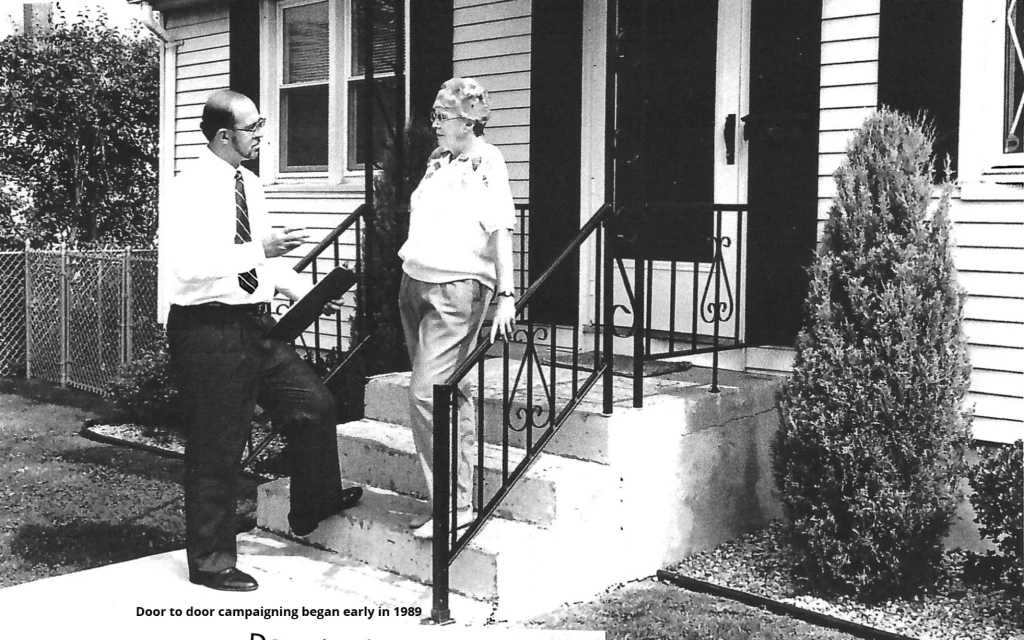
More good news came from the “Favorable, unfavorable” question as it pertained to Mayor McNamara or “Billy Mac” as he liked to be called. Responses to that question indicated that 37.5% viewed the mayor favorably, a real danger sign for an incumbent, and far below the 50% standard which is believed needed for a strong incumbent candidacy. Approximately 95% of those surveyed knew who McNamara was. His name recognition rivaled that of the Governor and was indeed very high, as might be expected for a twelve- year incumbent. The bad news for Billy Mac, however, was that slightly over 59% of respondents either declined to rate him, or viewed him, unfavorably.
The results for my name recognition were starkly different. 67.6% did not know who I was or could not offer a view on favorability. This revealed a major weakness – name recognition. It also suggested that, if the campaign did not move quickly to define my character, the opposition would. That could be disastrous. We could take a bit of solace in the findings in that, of the approximately 32% of respondents who did know me, I had a net favorability of 7%. None-the-less an enormous amount of work lay ahead. Two questions were asked on the Vietnam issue. One question “Would you be more or less likely to vote for someone who refused to serve in the Vietnam War?” was designed to get a read on the issue, if not presented in the context of obtaining an allowable and legal CO designation. The second question,“ Would you be more or less likely to vote for someone who objected to the Vietnam War and who performed alternative service to military duty?” was designed to evaluate responses in the context of an objection to the War and the alternative service component of the story.
On Trial
Aside from the poll, we knew the CO issue was going to be a focal point of the opposition, and while we expected it to come soon, we did not know exactly when, or how, the matter would be raised. It did not take long to find out.
I had announced my candidacy on Friday, February 10th. On Tuesday, February 14th the New Britain Veteran’s Council, an association of New Britain’s 15 active veteran’s organizations, met and proposed a resolution denouncing my candidacy, be referred to each member organization for consideration.
Essentially, my character and candidacy would be put on trial by 15 autonomous veteran organizations who would then bring back their decisions to the Council for further action in March. Under Council rules, it could not pass a resolution unless each membership group voted on it. Prime movers of the resolution were identifiable McNamara supporters, and although they denied collaboration with his campaign, the connection was obvious. It was now clear that McNamara was not going to address the CO issue directly, but have it addressed by his allies in the veterans’ community. The objective was also clear. They wanted to deliver a quick, sharp knockout blow designed to take me out of the campaign even before we got started.
When the news article hit the street on the 15th I was away in Florida on union business. Diane dealt with the immediate fallout and called me with the news. We needed to respond to this initiative soon. Our earlier preparation now proved to be invaluable. We had secured a list of the various veteran’s organizations and their leadership. When I returned home at the end of the week I reached out by phone to the commanders of each organization. Some were willing to talk, others simply said they appreciated the call, but felt strongly about the issue and planned to support the resolution.
In the days immediately following my announcement local newspapers ran stories and editorials about the prospects my campaign. On Wednesday, February 22nd the Hartford Courant ran “Mayoral Candidate Defends Wartime Status” by political writer Marc Crowe. In the article I said:
“Every citizen in this country has a responsibility to question their government’s leadership, if they think it is wrong… I certainly am not ashamed of the position I took… and.., in terms of moral leadership, it was a high point in my life.”
Articles also accurately outlined the process by which one can be granted a CO designation, indicating that it was a recognized and legal process, that it had to be approved by the government and that suitable alternative service to military duty had to be approved by Selective Service. The criticisms of the veteran’s groups were also included.
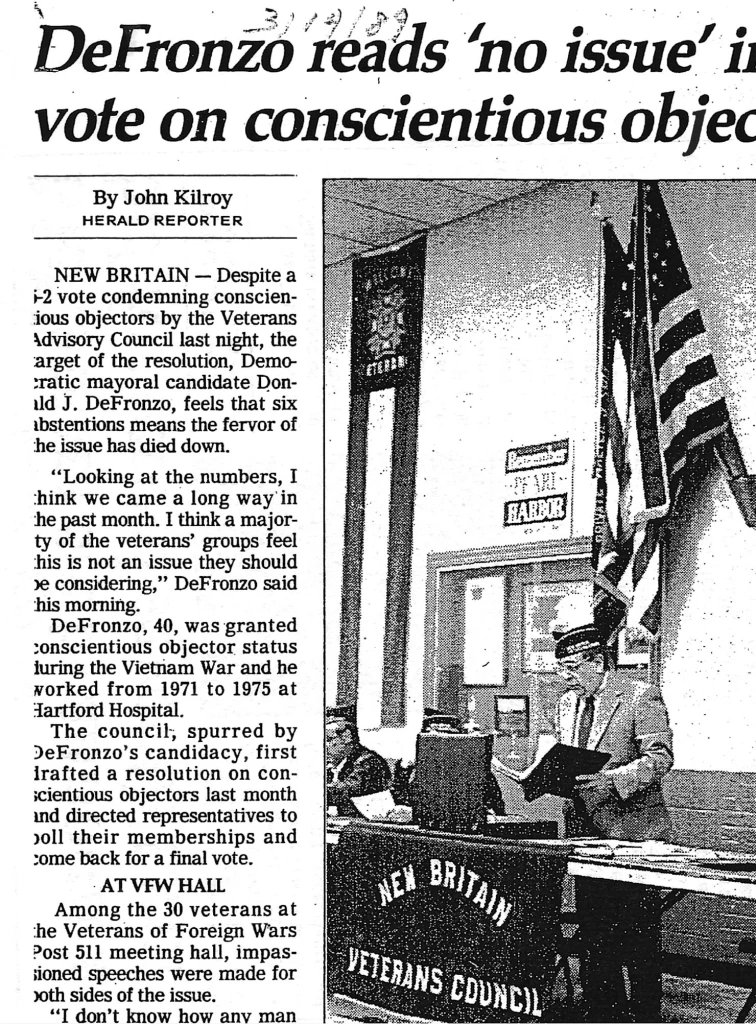
On Tuesday, February 21st The American Legion Post, led by Moe Parparian, a close McNamara ally, approved a resolution “condemning COs who seek political office.” In part the resolution read as follows:
“We do firmly believe and strongly support the policies, principles, and the values of the American way of life, including defending our country’s honor and freedom. We also believe those who hold leadership positions in our government should also support, defend and exemplify this dedication to the American way.”
Although not mentioning me by name, it was clear who they were talking about.
On Thursday, February 23rd the Hartford Courant published another article, “New Britain Candidate Reflects on his Service”. This was my personal story of applying for CO status, my family’s reaction and my alternative service. Again, I stressed the moral challenge of the Vietnam War, the legality of the actions I took and how the CO status differed from those who sought asylum in Canada or who deserted the service.
Our first real break in the CO saga came on Wednesday, February 22cnd when the VFW Post, the city’s largest veteran’s organization, voted to stay neutral. Paul Mangiafico, post commander, said “we don’t see how his (DeFronzo) CO status affects how he would run the City of New Britain.” This was reflective of our poll results, but, more importantly, it showed that McNamara did not have a monopoly in the veterans’ community. In fact, it became clear that veterans liked to play politics too, and many were just sick and tired of Billy Mac. Mangiafico would end up as a successful candidate for City Council on the DeFronzo Slate.
It hadn’t made the newspapers, but we learned later that on Friday, February 17, the Catholic War Veterans Post 981 met. McNamara, a member, attended, but was not allowed to speak. Perhaps the most fortuitous event of the entire campaign occurred that night, when Mike Brunning, Post Commander, revealed that he himself, had been a conscientious objector in Vietnam. He said “We ( the CWP) was not a political organization. …These veteran’s groups ought to get out of politics and begin working for veterans.” With that the Catholic War Veterans voted to remain neutral. Later Brunning would write a poignant letter to the editor of the New Britain Herald laying out a moving and compelling defense of the CO designation during the Vietnam era. Coming from the commander of a veteran’s organization, Brunning’s story added great credibility to the legitimacy of my candidacy.
A day or two later, the Italian American War Veterans, led by former Republican Mayor and McNamara’s Public Works Commissioner, Paul Manafort met and condemned my candidacy. Manafort commented”… no one has the option of refusing to defend the Constitution of the U.S. in time of crisis when called upon.” He added, “I would cross party lines if I had to, to prevent a CO from serving as mayor of the city.”
Manafort was a second cousin of my deceased father and my mother always maintained cordial relations with him over the years attending various family events. However, when she saw his comments that relationship ended in a hurry. She reminded me how, even though we were Democrats, when Paul ran for mayor, we would have his sign on the lawn. She was very upset about his remarks and never had any use for him after that.
This was all happening within ten days of my announcement. Each one of these veteran’s meetings/trials was featured in a front-page news article in the New Britain Herald and in lead articles in the Regional News section of the Hartford Courant. Jim Leavenworth, my top communications guy, a long-term media professional, believed that the publicity was quickly addressing one perceived weakness in our campaign – name recognition. He felt we were handling the issue well, and, although the general sense of some of the articles may be seen as negative, the new understanding each brought, the insight each provided to the morality of the issue, and exposure to the way I could handle a difficult issue under pressure were an advantage to the campaign. In addition, he thought the over-arching approach being taken by my opponents was not going over well and adding to Mac’s image as an arrogant bully.
I had called “Moe” Moses Parparian on Friday, February 17 when I had returned from Florida. I spoke to him, and we agreed to meet for a discussion on the following day. In what was my most ill-informed decision of the campaign (some would call it plain stupid), I met with Moe at the American Legion Hall on East Street. I went alone and Moe, with four or five members, took turns stereotyping my CO status and explaining why there was no chance for me to win office in New Britain. I had hoped for a fair and open discussion, but what I got was a set up.
Sticking to our game plan, I endured the criticisms for about 45 minutes, thanked them all for their time and respectfully excused myself. I would not do that again.
Other smaller veteran’s organizations met and debated resolutions in the latter part of February and into March. The Northwestern Memorial Veteran’s Post, led by Leon Hermanowski, another McNamara supporter, compared a CO to a deserter or draft evader. They approved the resolution condemning my candidacy. A similar outcome came from the Jewish American War Veterans, headed by Ed Honeyman.
By now editorial comment was being made both in the Hartford Courant and in the New Britain Herald, as well as in numerous letters to the editor. Peter Pach, a Hartford Courant columnist wrote on February 23:
“Ironically, those taking pot shots at DeFronzo served and fought for his right to dissent. Then, as now, it is not easy to defend a position of conscience when confronted by intolerance.”
On Saturday, February 25th, in its lead editorial “Not a Political Issue”, the New Britain Herald said: “… in New Britain a mayoral candidate’s CO status has become an issue of controversy because some local veteran’s organizations, who so diligently protect the flag, have chosen to make it one.”
The editorial went on to say CO status: “… was not a badge of dishonor. It was a mark of conviction…It has little to do with advancing the city into the 1990s.”
On Thursday, February 23rd popular incumbent City Clerk Richard Murphy, a decorated World War II veteran, who had previously announced his retirement, reversed course. In his announcement Murphy said: “If it was anything else, I wouldn’t run. But I don’t want DeFronzo to be part of my city. …I refuse to seek the solace of retirement when our community is threatened by a philosophy alien to its people.”
As vicious as this pronouncement was, I didn’t think it would amount to much. It is always unlikely that a down ticket candidate can seriously affect the top of the ticket. No matter, his vitriol and characterizations bothered me and I resolved that, even if I could not win, I wanted to help grant Murphy his retirement wish on September 12.
Paul Manafort, the Mayor’s Public Works Commissioner, wrote a letter to the editor of the New Britain Herald saying he was “compelled to speak” about the possible selection of a CO to lead the city. “No city needs a mayor who doesn’t want to serve or get involved.”
Between the concerted attacks of McNamara’s veteran allies, Murphy’s reversal and the attacks coming from his top advisors, it was becoming clear that Billy Mac was taking our Coalition and my candidacy seriously. On our side, despite the public onslaught, not one of our Coalition members shifted positions or abandoned the campaign. I was gratified by that show of confidence and resolved to work even harder. At the same time, I felt beat up by the attacks and energized by the loyalty of campaign workers and Coalition members.
In the third week in February, a full six months before the September primary, I began knocking on doors, introducing myself to voters and answering their questions. The CO issue was rarely raised. Much more often comments dealt with taxes, education, crime and the need for a change in City Hall, providing additional confirmation of our poll results.
Occasionally I did get a few doors slammed in my face and on one day in particular I stumbled upon two or three very negative reactions in a four or five block area. I was very dejected about that, but interestingly my nine-year-old daughter encouraged me to get back out there the next day and I did. Fortunately, that occurrence was unique, and overtly negative reactions were, actually, quite few.
The campaign’s first major fundraiser was coming up on the first Sunday in March at the Ukrainian Social Club Hall on Oak Street. Securing a strong turnout was essential; a poor showing would slow our progress, create doubt, and give our opponents something to talk about. To ensure attendance we printed hundreds of $10 tickets, stamped paid on the back, and distributed them at the New Britain Senior Center, where Clebowicz’s father held court each day, and throughout the senior apartment buildings around town. We also pressed hard with my union supporters, political allies and others.
Coalition members came through and we had over 300 in attendance, including a few of McNamara’s commissioners trying to hedge their bets. One well known Police Commissioner came early and hid in the kitchen to avoid being seen. He asked to see me when I had a few minutes. Working my way back to the kitchen, he greeted me with a strong handshake, palming me a fifty- dollar bill in a classic New Britain political gesture.
Adam Platosz, one of our candidates for City Council and a Ukrainian Club member, played his accordion for hours entertaining the many seniors who were in attendance. A Ukrainian youth dance group, the Zerkie dancers, also entertained adding a little culture to the event. To augment the fund-raising effort, the Finance Committee held a raffle, a feature that would become a signature part of all future campaign fund raisers. Volunteers and supporters contributed bottles of wine, gift certificates, lottery tickets, baked goods and crafts.
Leanne Valengavich, who graduated from Saint Thomas Aquinas High School with Diane and me, had been making stuffed animal dolls for sale. She contributed several of her products for that first raffle, and, as it turned out, every raffle thereafter. By the end of that nine-month campaign, she must have given us several dozen stuffed giraffes, elephants, dinosaurs and a variety of other creatures. The number of raffle prizes was a sign of enthusiasm and support, but often added 30 to 45 minutes to each event. No doubt it was very popular with our supporters. It was another non-traditional, family-oriented aspect of the campaign that helped set me apart from the big dollar cocktail parties of my opponent.
A few speeches were made, but generally, it was a good time, and the sizable turnout made a statement. Platosz would go on to play at all our campaign events, claiming in the end, that his playing earned him the votes he needed to win a spot on the City Council.
The date for the Veteran’s Council meeting arrived. On March 13th the Council convened to tally the decisions of its 15 member organizations on the CO issue. There had been a lot of news coverage over the past month, but our campaign could not predict an outcome. When the votes were counted, five organizations supported the proposed resolution, two opposed it and six organizations abstained – not taking a position. As a result, only five of the 13 voting member organizations in attendance, supported Parparian’s resolution, and four of the five were directly controlled by Mac’s allies, Paul Manafort, Moe Parparian, Leon Hermanowski and Ed Honeyman. When asked to characterize the outcome, I said:
“Looking at the numbers I think we came a long way in the past month. I think a majority of the veteran’s groups feel this (the CO issue) is not an issue they should be considering.”
The headline in the New Britain Herald the next day read, “DeFronzo reads ‘no issue’ into vote on conscientious objectors”. That was probably the best outcome we could hope for, and the vote clearly supported that conclusion. Parparian who chaired the meeting said veteran’s groups “…would not campaign against DeFronzo” and the Council would take “no further action.” Cheapening the whole episode, Moe said, “As far as the Council is concerned, we voted and that’s it. It’s just letting off steam, I guess.”
It appeared that McNamara’s first attempt at exploiting the CO issue fell short of its goal. The Veteran’s Council was badly split, and the lack of consensus gave credibility to our argument that the CO issue was not relevant to the mayoral race. More importantly, if the Veteran’s Council strategy was intended to result in a knockout blow, it had failed. Still the issue would not go away.
Walter Clebowicz, a close campaign official, was approached by Mac supporters telling him it was time to “pull DeFronzo” from the race. DeFronzo could not take what was to come. Walter laughed them off asking what Mac was planning to do in retirement. Yes, we were in it to stay, and we were going to win. He was never subtle. No doubt, surviving the Veteran’s Council attack made it much more possible.
Back To Campaigning
I continued the door knocking campaign. I could already see that my name recognition was improving. More people were understanding and discounting the CO issue.
Even more, Mac’s heavy handed political manipulation of the veterans’ groups was re-kindling in many the sentiment that had contributed to his growing unpopularity. In a way I was becoming one with the large swath of New Britain voters that McNamara had alienated over the years.
I was heartened by the outpouring of supportive letters in the editorial pages – “Impressed with Mayoral Candidate’s Character”, “Character attacks way off base”, “More important issues in campaign for mayor”, Attacks on DeFronzo gain him a supporter” (from a veteran), “Heal the wounds”, “Where tyranny begins” (a veteran), “The point of service must be remembered” and “Question campaign relevancy of candidate’s CO stand on Vietnam War (a veteran)”; and, of course, the letter that crystalized it all, by Michael Brunning, the CO and Commander of the local Catholic War Veterans: “Saints, Vatican, presidents speak out on conscience”. His letter, quoting saints, the Vatican and presidents, was a powerful statement offering legitimacy to the CO designation. He quoted Saint Thomas More:
“We have no window to look into another person’s conscience, therefore, we cannot condemn anyone.”
He quoted John Kennedy:
“… war will exist until that distant day when the CO enjoys the same reputation and prestige the warrior does today.”
In concluding Brunning linked Manafort to McNamara and took him to task saying:“… it appears to me that Mr. Manafort is defending tyranny – not democracy.”
It is hard to believe that such a letter could not move an objective person to think more deeply about conscience. More press followed.
On March 20, Marc Crowe, a Hartford Courant political writer authored an article entitled. “Turbulent 60’s put 80’s candidates on a rocky road”. This piece discussed the challenge facing generational candidates raised in the ’60s now running for office in the ’80s. and facing changing norms and levels of acceptance. It put things in context. On March 24th, the Courant editorialized “Paying one’s dues”, the Courant commenting on the CO matter said:
“Mr. DeFronzo was neither dishonorable or dishonest, but thoroughly straightforward and even courageous. He believed the war was wrong and said so, took the consequences and has stood by his decision… he paid his dues….the nation will grant amnesty to those who went to Canada, understanding to jurists who floated the law, and absolution to Vice President Quayle, but for some in New Britain, a man of conscience apparently, is not to be forgiven.”
Another Courant editorial said, “… a CO is not the equivalent of a draft dodger or deserter. Mr. DeFronzo should be judged on the merits of his vision for New Britain…”
Both major area newspapers had forcefully and repeatedly came down on the side of our argument that the CO issue was not relevant to the mayor’s race. That was encouraging.
As the campaign entered April, the campaign focused on traditional urban issues. Having survived Mac’s initial knock out attempt in February and March, I was being taken far more seriously as a candidate. Service organizations, community groups and neighborhood organizations invited me to speak or discuss issues. Our volunteer numbers and our contributions continued to increase. McNamara had a firm grip on city unions. They all endorsed him, except the firefighters who stayed neutral.
On April 2, Mac, citing the economic progress of the city, finally announced his plans to seek a seventh term.
We did not think Mac was done with the CO issue. He deeply believed he could make that, and my progressive politics a decisive issue, but at least for the moment, we could build our organization on the issues and the theme of needed change in City Hall.
Jim Leavenworth was right about name recognition. No less then eleven front page articles in the New Britain Herald between February 9 and March 24, along with three lead editorials on the CO issue, had vastly improved my name recognition and elevated my status as McNamara’s primary political opponent.
Coverage in the Herald was augmented by lead stories in the Regional Section of the Hartford Courant, the state’s premier newspaper, along with several lead editorials and opinion columns. Moreover, dozens of letters to the editors of both newspapers, pro and con, also bolstered my name recognition with the added advantage of demonstrating widespread support for the notion that, at the very least, the CO issue was not, in and of itself, disqualifying. I did take sharp criticism from some, especially McNamara’s supporters in the veteran’s community, but a surprisingly large number of letters came from veterans, who, while not expressing direct support for my candidacy, did view Mac’s position and tactics as needlessly divisive. To an increasing degree, as much as I was being judged, Mayor McNamara was also being judged.
Good news also came in the form of campaign contributions, not enough to match McNamara, but certainly enough to run a viable campaign. The number of volunteers was increasing and we were making significant inroads into the city’s large Hispanic community. This was particularly important because McNamara, to his credit, had appointed an African American to be Police Chief, and, as a result, had the leadership of the Black community firmly in his camp, although rank-and-file African Americans supported me.
Another sign of growing political respect was the number and quality of potential candidates who wanted to run for office on our slate, which had to include, in addition to a mayoral candidate, candidates for Town Clerk, City Treasurer and Tax Collector, 15 candidates for City Council, 3 candidates for Board of Education, 2 candidates for Board of Tax Review, and 4 candidates for Constable, or 26 in all. Already, two incumbent city aldermen, one from the Harper camp and one from the Krawiec camp had announced plans to abandon McNamara and join our challenge slate. In addition, several former disenchanted McNamara allies approached our campaign for a new home. We also had hopes of getting popular, long term City Tax Collector Fred Menditto, a close ally of Joe Harper, to run on our slate. All of this strongly indicated that the CO issue, generally perceived to be the campaign’s Achilles Heel, was being managed about as well as we could expect.
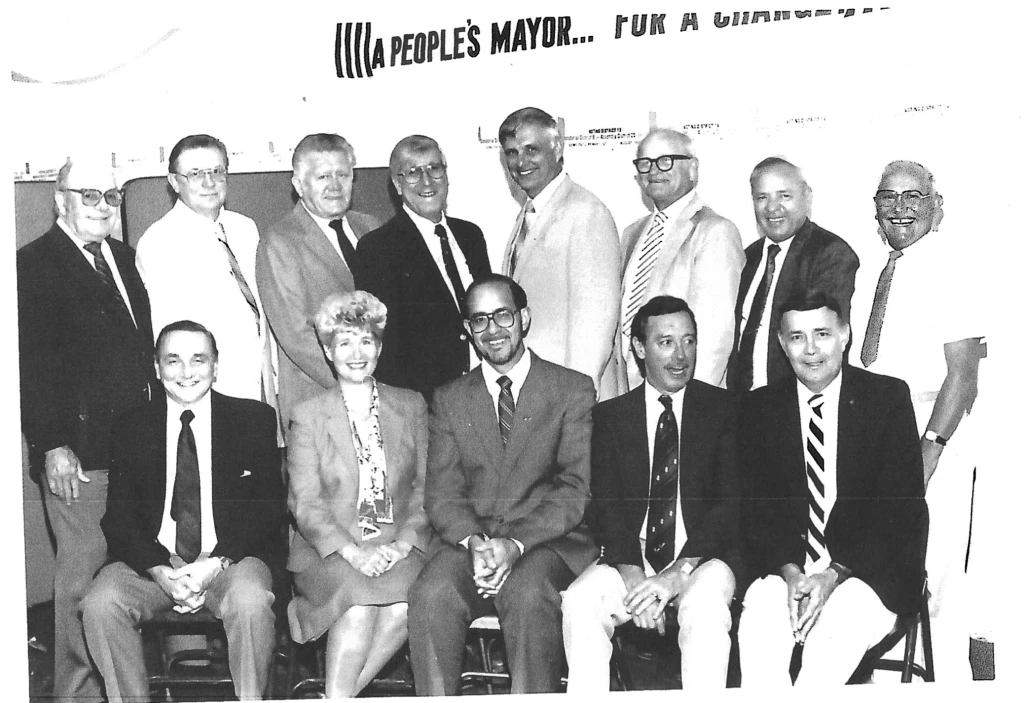
Early in the campaign we were all about visibility and name recognition. Toward that goal, in early April, we had planned to assemble a group of supporters, with signs, at the opening home game of the New Britain Red Sox baseball team. We had high hopes for a great visibility event. Five or six volunteers had agreed to be there in the parking lot area with hand painted signs. Mayor McNamara would be attending the game so we thought we could send him a polite message as well.
Walter Clebowicz and I arrived at Willow Brook Park early and took up a good location in the parking lot, plainly visible to the thousands of fans who would be coming in. Unfortunately, for various reasons, none of our volunteers could show up, leaving the two of us to wave to the arriving crowd while holding “DeFronzo for Mayor” signs. It was a pathetic demonstration of support made even worse when a couple of our slate members stopped to say hello, but went on into the stadium without offering any assistance. It was really the only time in the entire campaign when volunteers let us down.
Determined, Clebowicz and I stuck it out. We did get a few thumbs up signs, but we had miscalculated how much of the crowd would be out-of-towners. Still hundreds of New Britain residents saw us and got the message. Mac showed up, took a quick glance in our direction and hurried into the park to throw out the first pitch. We were heartened when a few minutes later, over the public address system came the introduction: “Ladies and gentlemen, boys and girls, please welcome William McNamara, Mayor of the City of New Britain.” The announcement was immediately followed by a thunderous chorus of boos. We were delighted and encouraged and felt our efforts were not in vain.
As we made our way to Walter’s car, a park attendant approached us asking if we really thought we had any chance of beating Billy Mac. Always quick with a comeback, Clebowicz said “… the only way McNamara will get into this ballpark next year is if he buys a ticket.” As usual, Walter turned out to be right.
By now my day had settled into a predictable pattern. I was still working at the union office half days, using accumulated vacation time to leave early and canvass. I never canvassed less than five days a week, or less than 50 homes a day. My goal was no less than 300 doors a week.
Before leaving for work at about 7 AM, each and every morning, except on Sundays, Jim Leavenworth, our press specialist, would call to review the morning press reports, assess the need for responses, finalize any of our releases for the day and to anticipate incoming fire from the Mac campaign. Incredibly efficient, this call took about 20 minutes. That was a bit early for me, but well worth the time and effort. Planning, preparation and the ability to respond quickly are characteristics of a winning campaign.
Jim and I developed a close friendship which lasted until his death some years later.
Following Jim’s call would come the call from Joe Harper, commander in chief of the Coalition’s campaign, usually around 8:30 or 9. He would review what I had planned for the day, what neighborhoods I was planning to visit, financial issues, fund raisers, composition of the slate and anything else that might have come up. This process insured discipline, consistency and helped prevent any miscommunication. I always felt I had complete knowledge about the campaign even though I was separated from many of the day-to-day decisions. Joe took responsibility for keeping Stan Krawiec and other leaders of the Coalition informed, although I was accessible to all of them, if needed.
Joe and I remained close political allies for years and in 2003, after a bitter primary campaign, I assumed his former State Senate seat in the Connecticut General Assembly.
After my union work, I would leave the office about 12:30 PM return home, check in with Diane and the kids and be canvassing by 2:30 or 3.This would allow me to contact seniors home during the day and overlap into the time when workers would be returning home at 4:30 to 5:00. I’d walk until 5:30 or 6 and sometimes later, if I was on a roll.
After that I would go home for dinner and catch up with Diane on family issues. At this point, while still working, she had assumed virtually all school and home related responsibilities, while also being very visible and helpful in the campaign. She was also my most reliable and realistic sounding board for campaign tactics, ideas and speeches. Her opinions influenced me more than she could ever know. Following a brief time at home, there would usually be a campaign meeting of some type, maybe a fund raiser or interview with a potential candidate or the press.
Once our phone bank was up and running, I would stop in there each night to thank the volunteers and talk for a while. Rosemary Klotz, a newcomer to New Britain, volunteered for the campaign early and demonstrated a level of maturity, judgment and responsibility that allowed her to take on increasingly more important campaign duties. For all practical purposes, by the end of May, Rosemary had responsibility for coordinating all aspects of the phone bank. This was the heart of the operation. Those individuals who I had canvassed were called as a follow up and coded for their level of support or opposition. Other Democrats (there were approximately 21,000 registered in New Britain) were called, neighborhood by neighborhood, to introduce the campaign and assess support. Information on favorable voters constituted our target list for election day and those who were leaning in our direction were coded for additional attention. Thousands of calls were made, and by the time of the primary in September, we had identified over 3,000 likely DeFronzo voters.
Rosemary had to manage the voter lists, all manual in those days, record the results, ensure an adequate number of volunteers each day and , in the process, keep everyone happy. It was a grueling assignment. For a newcomer who had to learn a lot about New Britain and its political personalities, she did a remarkable job. Most voters targeted by our campaign received three or more phone calls before election day, and additional calls on September 12. Upon taking office, I appointed Rosemary as my Executive Aide.
At about ten o’clock each night Walter Clebowicz, a trusted friend and successful attorney and also an ardent critic of Bill McNamara would call. He would review the events of the day. Where did I canvass? What were people talking about? Was there a pattern? How many doors did I get to? As an attorney, Walter interacted with a different set in the community, many of whom were McNamara supporters. His assessment of their behavior and conversation was always insightful. Clearly, by mid-April, they were taking the challenge seriously. Having failed to convince Walter to “pull DeFronzo early” , they were now trying to defend McNamara, something we were about to see a lot of.
Following my victory in 1989, Walter would win the Probate Judge election in 1990. He served there until he reached mandatory retirement age. Even before the mayoral race Walter was a close friend. His advice was always sound.
Another relative newcomer to New Britain was John McNamara (no relation to the mayor) who had joined the Democratic Town Committee with distinctly progressive views. He immersed himself in campaign work, regularly making phone calls and taking on any task assigned to him. He was a good writer, with good organizational skills and an elevated level of energy. At one point in the campaign, when we were short on Town Committee votes, he drafted his wife, Pat, to fill a seat on short notice, providing us with the decisive vote we needed. During the campaign he took on added responsibility. Later I appointed John Chairman of the city Building Commission, a position he excelled at during a period of great stress following a terrible apartment fire (Erwin Place) resulting in ten deaths and requiring a major investigation and ultimately a reorganization of the Department.
In 1994 John would assume the Chairmanship of the New Britain Democratic Town Committee, a position he would hold for 22 years, becoming the longest serving Democratic Town Chairman in New Britain’s history.
Key Issues: Economic Development and Neighborhood Revitalization
During this period, we established a clear distinction between Billy Mac and me on the matter of economic development and neighborhood revitalization. Mac’s tenure had been characterized by a running battle with neighborhood associations advocating for local improvements. This had escalated to the point where Billy Mac would not meet with, nor would he allow his department heads to meet with, any neighborhood organization unless the meeting was to take place in City Hall. In contrast, McNamara was wining and dining prospective developers wherever he could. He incentivized investment with discretionary tax breaks, which only aggravated community activists more.
I made an issue of this and proposed a more realistic balance between neighborhoods, where taxpayers lived, and downtown investors, who mostly lived out of town. Local improvements, parks, roads, sidewalks that benefited residents proved far more popular than did subsidies to out of town developers.
The mayor’s lack of accessibility also frustrated New Britain voters. I pledged to hold regular neighborhood meetings around town, if elected. Bit by bit I sensed we were moving voters and these real-life issues far outweighed any lingering concerns about the CO issue.
I also touted my public administration background and challenged the spending practices of the current administration. Sizable tax increases were passed by McNamara in previous years and culminated with a 10% increase in 1989. For a city already struggling with one of the highest tax rates in the state, an increase of that magnitude was devastating.
Another issue which had emerged was McNamara’s plans to rehab City Hall at a cost of $24 million. In and of itself, it wasn’t a bad idea, but the excessive cost and his approach to the project raised concerns. The plan called for re-locating the City Health Department to condo space in the Gates Building, a property owned by Colonial Realty. It appeared to be a sweetheart deal, and sometime later that charge was confirmed, but for now it was another issue that brought into question Mac’s differential treatment of downtown developers. We attacked him on it, raised red flags, advised caution and urged careful deliberation by the City Council prior to final approval of the deal. The Gates Building accommodation would later become a major scandal.
The issue papers we distributed to the press got good coverage – very often front page in the Herald and a prominent position in the Hartford Courant. These were substantive articles, maybe boring to some but they demonstrated a sense of thoughtfulness and professionalism that did not always characterize New Britain politics. It wasn’t long before McNamara began responding to our issue papers. My position paper on education would be refuted by Mac one week and my position paper on policing would be refuted the next. The important take away though was that McNamara, by taking these papers seriously enough to respond, had elevated my campaign to a higher level. In many respects we were now playing on the same level, a very good thing for a challenger.
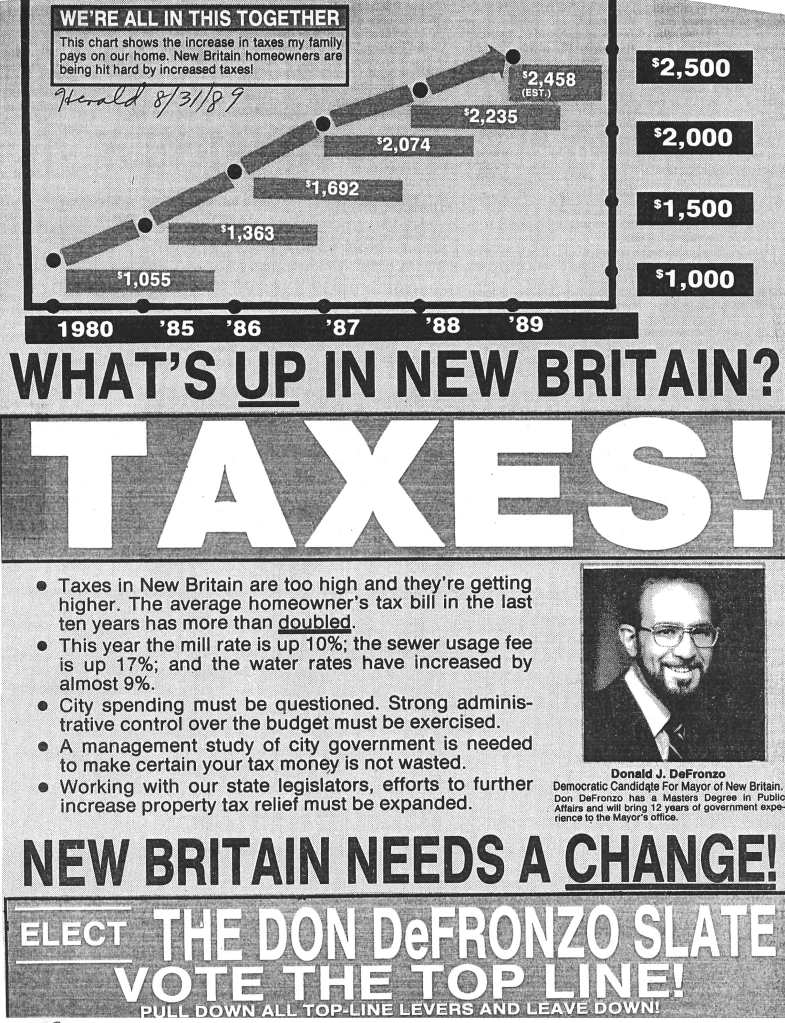
A lot was happening as we turned the calendar and started May. Now, in addition to the endorsements of state Representatives Stan Krawiec and David Pudlin, I gained the support and endorsements of New Britain’s other two, more conservative representatives, Ray Joyce and Joe Raia, each with a considerable personal following. Support from these two more moderate political leaders continued to dampen CO concerns and lent greater credibility to my efforts. I now had the support of the city’s entire legislative delegation, a fact that spoke volumes to the growing threat I now posed to the mayor.
On May 16 we announced that three prominent individuals had joined our slate. Lucian Pawlak, the City Treasurer and a leader in the Pulaski community; Steve Wasik, a member of our Coalition associated with the Pulaski Democratic Club, and; Barbara Kirejczyk, wife of Pulaski Club President Ed Kirejczyk and a two-time unsuccessful mayoral candidate. Pawlak would run for Town Clerk against Murphy. Wasik would run for City Treasurer and Kirejczyk would run for City Council. These were three well-known Polish community leaders and their commitment to our slate sent a strong message to the Polish American residents of New Britain. We are lining up with DeFronzo. He is safe. He is qualified and he is going to win.
On May 23 we opened a headquarters in one of New Britain’s poorest neighborhoods. Nightly phone calls began first to those voters I had canvassed and next to voters I had not yet visited. Volunteer phone callers turned out in good numbers and represented each of the Coalition’s component groups. These were augmented by volunteers drawn in by Walter Clebowicz and his strong popularity in the Ukrainian community. Three nights a week five to seven older Ukrainian women, most of whom spoke English, Ukrainian and Polish, came and made calls. The bonus was that these ladies loved to bake and whenever they came in they brought with them a variety of baked goods which were shared with all the volunteers. At night’s end all the volunteers socialized over the Ukrainian breads and cookies. People enjoyed coming into headquarters.
Our children, David, 12 and Karen 9, often came with us to the headquarters. They might help out with menial tasks, but they loved the pizza house next door. Some of the other volunteers brought their kids, and more often than not, we would finish off the night with pizza or a grinder. They developed some good friendships that lasted for years. Our children were very good during the campaign.
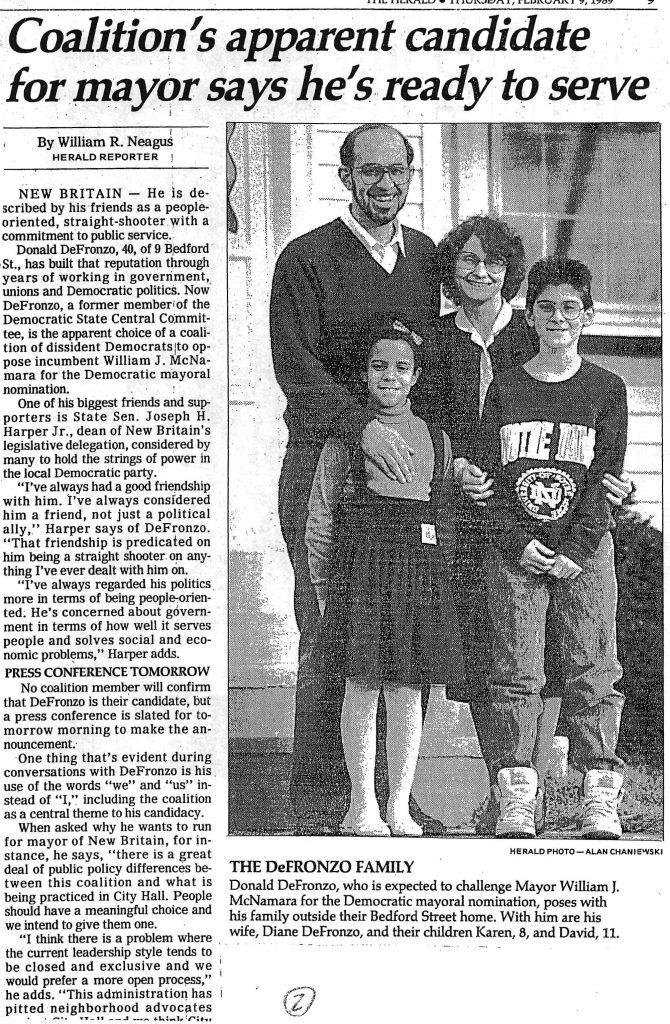
In addition to activities at the headquarters Diane maintained a dedicated group of 8-10 reliable volunteers who were responsible for most campaign mailings, mailings for fund raisers, rallies and even larger general mailings to voters. Diane had set up a network and when the materials were ready to be mailed these volunteers would pick up, or have delivered, envelopes, materials, stamps and mailing labels (sometimes they had to write out the names and addresses). They would have a few days to complete their work, after which Diane collected the stuffed envelopes, sorted the zip codes and got them into the mail. It was a low-cost efficient operation. We could not afford mail houses back then.
Fred Menditto, a popular, seven-term incumbent City Tax Collector had been mulling over his options. Both campaigns wanted him on their slate, but for me it would be a major coup. Fred and Joe Harper had been long time political allies and Joe was working him regularly. On Thursday, May 25th Menditto announced his decision to run with DeFronzo. It was major news and very good news for us. Fred’s decision added still greater credibility to my candidacy and momentum to our campaign. When asked why he wasn’t sticking with Billy Mac, Fred confidently said I’m going with DeFronzo “because he’s going to be a winner.”
We continued to make inroads into the Puerto Rican and large Hispanic community. In 1989, despite constituting 15% of the city’s population for more than a decade, no Hispanic had been elected to the City Council or Board of Education. I actively encouraged Hispanic candidates and we were identifying some incredibly well qualified individuals. Later, inclusion of Hispanics on our slate would be a big story and helped us attract new and previously inactive voters to the polls. Some Mac supporters, knowing there was a bias against Hispanics in some elements of the New Britain community, tried to smear me as overly sympathetic to these voters by referring to me as “Senior DeFronzo” and his band of Puerto Ricans. It was another foolish attempt to diminish our campaign, but, as far as I could see, it never had an effect.
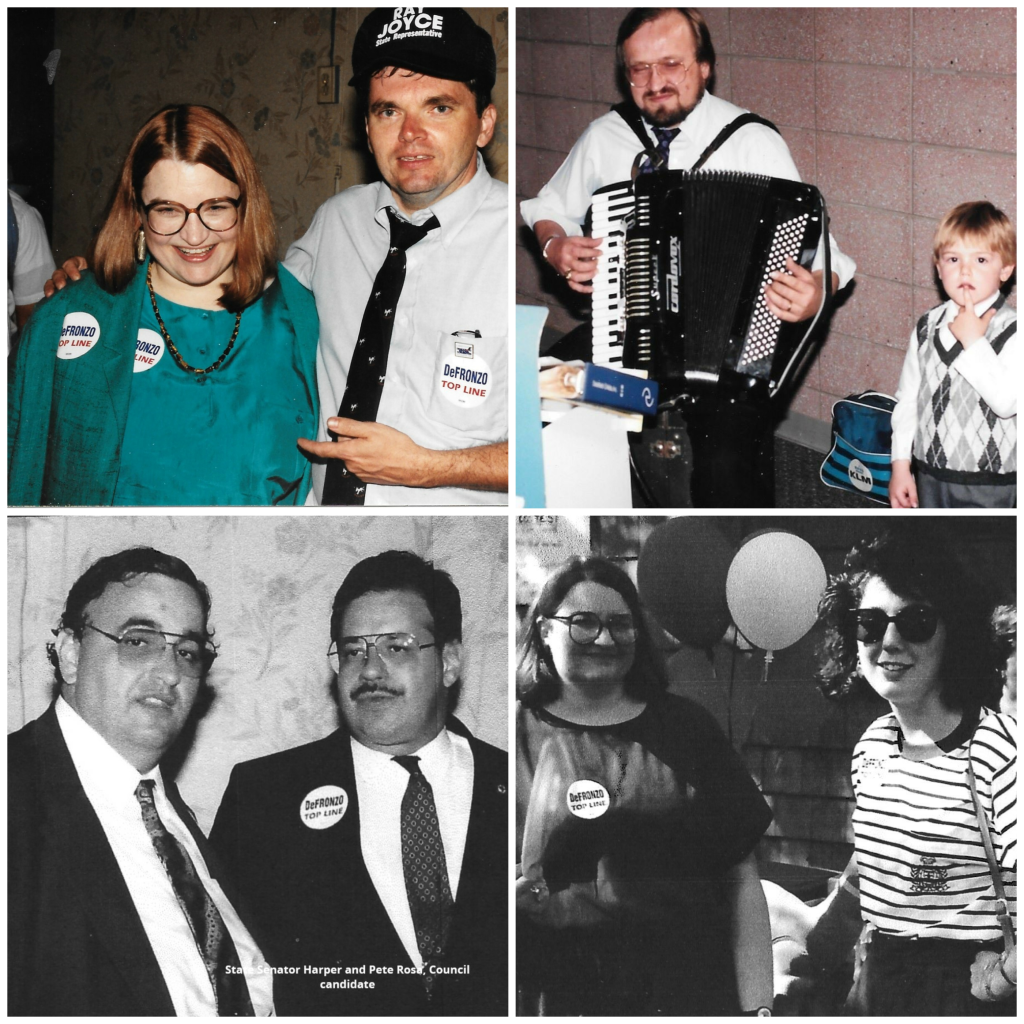
The Hispanic community was eager to assume a meaningful role in New Britain politics. For much of the 1980s Joe Harper, Clebowicz, myself and others had worked to increase the number of Hispanics on the New Britain Democratic Town Committee (NBDTC). Having maneuvered a rules change through the Town Committee in 1985, the membership of the Committee was significantly increased and the opportunity to add new minority members presented itself in 1987 when the Committee was reorganized under the new rules. In the Town Committee districts we controlled, we added new Puerto Rican members, signaling our serious interest in establishing a new partnership with New Britain’s growing Hispanic community.
In 1989 Peter Rosa, Alex Aponte, Marylin Cruz-Aponte, Ed Saavedra, Rolando Centeno and Ruth Vasquez-Centeno assumed leadership roles in organizing the Puerto Rican and broader Hispanic community in joining our campaign. By the time the primary rolled around in September, dozens of Hispanic volunteers were active in making phone calls and turning out the vote.
The eagerness and enthusiasm of these volunteers was impressive. On Primary Day our home on Bedford Street served as a satellite headquarters for phone calls into the east end voting districts. When I stopped by to thank the volunteers there, two Hispanic women excitedly thanked me for giving them the opportunity to be involved in the campaign and to work out of my home. I couldn’t believe that, but it did demonstrate their longstanding, and unfulfilled desire to be involved in New Britain politics.
In addition to the Hispanic bloc, our team succeeded in involving a number of former Mac supporters. In fact, Jim Leavenworth had been a close McNamara confidant, but had experienced a falling out with the mayor a few years earlier. Jim, eager to put his considerable writing and public relations skills to use, was an early volunteer to the Coalition slate.
Another high-ranking McNamara administration official, former Police Commissioner James Frugale, also signed up. His insights into Mac’s political operations were valuable and, along with Leavenworth’s insider information, provided our leadership group with strategically important information about Mac’s inner circle and decision-making process.
Frugale suggested, almost insisted, that we hire a local portrait artist to draw a caricature of me for use at campaign events and fundraisers. I had never heard of this before, but Jim said McNamara had one done in each of his campaigns and used it effectively at his events. We followed Jim’s advice and spent $200 on the caricature. We used it at a few early campaign events, but it did not strike a responsive chord with our volunteers. Soon we relegated the work to a back wall at campaign headquarters. Fortunately, much of Jim’s other advice was more useful and after the primary, he was very helpful in lining up additional Mac backers.
At the end of May we added three additional candidates to our City Council slate. Peter Rosa, an accomplished educator became the first Hispanic and Puerto Rican candidate on our slate. He was well known in the Puerto Rican community and his decision was met with excitement. Adam Platosz, active in the Ukrainian community and an unsuccessful Council candidate in 1987 and Libby Devlin, a labor activist and newcomer to New Britain for the Council slate. A day or two later we added Joe Veneziano, a veteran and ally of Stan Krawiec and Jim Collin, a political newcomer to the list of candidates for Council.
To be continued…..

